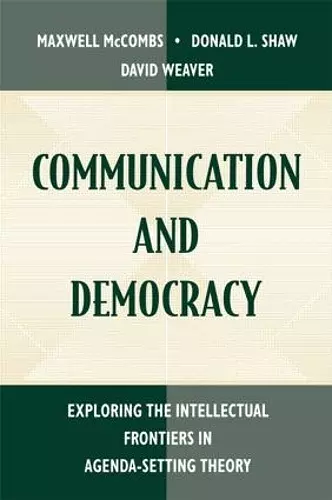Communication and Democracy
Exploring the intellectual Frontiers in Agenda-setting theory
Donald L Shaw editor David H Weaver editor Maxwell E McCombs editor
Format:Paperback
Publisher:Taylor & Francis Inc
Published:1st Jun '97
Currently unavailable, and unfortunately no date known when it will be back
This paperback is available in another edition too:
- Hardback£145.00(9780805825541)

Exciting intellectual frontiers are open for exploration as agenda-setting theory moves beyond its 25th anniversary. This volume offers an intriguing set of maps to guide this exploration over the near future. It is intended for those who are already reasonably well read in the research literature that has accumulated since the publication of McCombs and Shaw's original 1972 Public Opinion Quarterly article. This piece of literature documented the influence of the news media agenda on the public agenda in a wide variety of geographic and social settings, elaborated the characteristics of audiences and media that enhance or diminish those agenda-setting effects, and cataloged those exogenous factors explaining who sets the media's agenda. In the current volume, a provocative set of maps for explicating new levels of agenda-setting theory have been sketched by a new generation of young scholars, launching an enterprise that has significant implications for theoretical research and for the day-to-day role of mass communication in democratic societies.
At the first level of agenda setting are agendas of objects--the traditional domain of agenda setting research--represented by an accumulation of hundreds of studies over the past quarter century. At the second level of agenda setting are agendas of attributes--one of the new theoretical frontiers whose aspects are discussed in detail in the opening chapters. Other chapters offer maps of yet other theoretical frontiers, including political advertising agendas and their impact on behavior, the framing of various agendas in the mass media and the differential impact of print and TV, the theoretical role of individual differences in the agenda-setting influence of the news media on the public agenda, methodological advances for determining cause and effect roles in agenda-setting, and the application of agenda-setting theory to historical analysis. This volume is an invitation to others to become active members of the invisible college of agenda-setting scholarship. As such, the goals of this book are threefold:
* to introduce a broad set of ideas about agenda-setting;
* to enrich the exploration of these ideas by enhancing scholarly dialogue among the members of this invisible college; and
* to enhance the discussion of agenda-setting research in seminars and research groups around the world.
Agenda-setting has remained a...
"The writing is clear and consistent, a quality not always evident in edited books, and the content is sophisticated, appropriate for use in a graduate seminar."
—Journalism & Mass Communication Quarterly
"Taken together, the book is a must for political communication researchers, especially when it calls for further discussion of the concepts that guide our future research agenda."
—International Journal of Public Opinion Research
"This book, edited by the founding fathers of agenda-setting studies, puts the spotlight on the continuing evolution of agenda-setting theories. Featuring the work of a diverse group of young scholars, the book exemplifies the lively scholarly dialogue about the interplay of mass media offerings, audience reactions, and public policies in democratic societies. Quite obviously, the agenda-setting approach has lost none of its vigor since its inception 25 years ago. It continues to be an extraordinarily fruitful way to investigate mass media impact in an era of explosive growth of mass communications."
—Doris A. Graber
University of Illinois, Chicago; Editor-in-Chief, Political Communication
ISBN: 9780805825558
Dimensions: unknown
Weight: 530g
288 pages